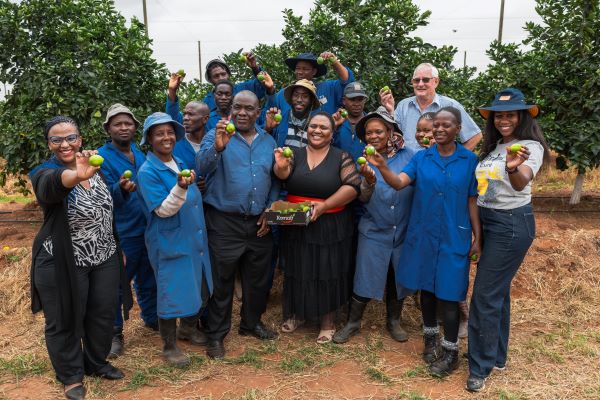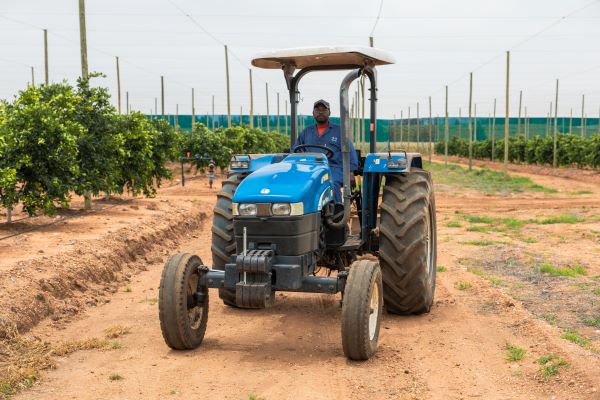SAB’s Corona beer is inherently linked to lime – a wedge of the citrus is traditionally served as part of the drinking ritual. Yet, as the beer became popular in the country, it encountered a severe shortage of limes. The business saw an opportunity to address that issue in a truly meaningful way that delivered value to people, the business, and the environment.
While limes are grown in South Africa, other citrus fruits are far more profitable. Of the over 90,000 hectares of citrus orchards in the country, less than 10% of the land is dedicated to limes. As a result, consumers either end up paying for expensive imported limes or they substitute them with lemons, which present a vastly different flavour profile. The opportunity, therefore, was to increase local production of limes to ensure that they were available to consumers, and at a lower cost than the imported crop.
The solution was a partnership between SAB, the Moletele Communal Property Association (Moletele Community) and Komati Fruit Group, in an exemplary Community Private Partnership (CPP), to establish and run a farming operation that would ensure reliable local production of limes. The Moletele Community made available one of their farms, Richmond Kopano Farm about 25km from Hoedspruit, which was on lease to the Komati Fruit Group. The CPP, which was entered into in 2020, saw SAB provide financial support to the tune of R19million, while Komati Fruit Group brought in farming expertise and skills development, and the Moletele Community contributed the land. All parties to the tripartite partnership are equally and actively involved, and that dedication has made Moletele Corona Limes, as the fruit is called, not only a reality, but also a benchmark for lime farming in South Africa.
Speaking at the launch, Minister of Agriculture, Land Reform and Rural Development, Ms. Thokozile Didiza highlighted that, “The Corona Moletele Limes project exemplifies the power of collaboration between private entities, communities, and the government, showcasing what can be achieved when we are all united for a common goal. This collaboration sets a positive precedent for future community-private partnerships in agriculture, showing a great potential to drive sustainable economic development. Stakeholders involved in the Moletele Limes project express optimism about scaling up successful initiatives to benefit communities, which is heartening. As government, we are encouraging similar collaborations across the agricultural sector, with equal impact on the farming industry as well as communities at large. It is a sure way to build a more resilient, self-sufficient, and prosperous agricultural landscape for South Africa.”

“This partnership is a purpose-driven intervention that truly exemplifies the beer economy in action and shows the unique power of beer to propel South Africa forward. In our commitment to invest in local industries that are connected to our supply chain, we are anchored in the farming fraternity, especially emerging farmers. Moletele Corona Limes are born out of that charge, and the fruit of this partnership has elevated the production of limes in South Africa, ensuring an all-year supply of the crop. Equally important is the positive change that this intervention has brought to the community of Moletele, from dividends that go to the beneficiary families to job creation, skills development and skills transference,” said Zoleka Lisa, Vice President of Corporate Affairs at SAB.
As an active partner in the production of Moletele Corona Limes, SAB has an offtake agreement in the CPP to buy a guaranteed number of limes. The remainder of the crop is either sold locally or exported. This setup in the partnership ensures that the Corona Moletele Limes have a ready market in SAB, guaranteeing revenue with every harvest. To date, a three-phase planting plan has totaled the tree population to 34,092 lime trees in the 60-hectare farm.
The farm uses an innovative split-block technique where across six production blocks, the farm mimics different seasons to keep the trees flowering at different times, and for much longer. Various crop husbandry interventions used include overhead netting, manipulation irrigation and soil water regulation, creating a highly controlled environment.
The first full harvest in 2023 produced over 1.1 million limes. All the proceeds from the sales of Moletele Corona Limes go back to the 1,615 families that make up the Moletele Community. Further, the workforce that tends to the farm are from the community, with 12 people employed directly, and with indirect employment, both full-time and part-time, supporting up to 55 households.
“This partnership with SAB and Komati Fruit Group is bearing fruit, thanks to the commitment of all the three parties involved. Our livelihoods have been bettered, profits are coming in and we are doing all this sustainably. We have become the largest lime producer in the country – this project is indeed our future!” said Albert Thabane, Chairman of Moletele CPA.
“As the Moletele Community, we are proud to be custodians of this land and we believe that strategic partnerships such as this are critical for the profitable use and longevity of our farming operations. And longevity is an important consideration because we envision a future where this precious heritage, the entire Moletele land, is passed on to future generations,” continued Thabane.
“Moletele Corona Limes tell an incredible story of will and partnership between communities and the private sector. The production has added an additional excess of 60% of landmass to land previously dedicated to lime production in South Africa. These limes tell the story of partnership, growth, empowerment, and our unyielding commitment to this country. And importantly, thanks to Moletele Corona Limes, Corona lovers have the best quality fruit for the well-loved drinking ritual, all year long. This is a win-win for everyone,” concluded Lisa.
SAB has been investing in agriculture in South Africa for many decades with a strong footprint in barley production. In 2020, South Africa produced only 60% of SAB’s barley requirements and due to several successful partnerships in agriculture, the country’s produce has swelled to an excess of 20% of the requirement. Due to these partnerships, many emerging farmers have grown to become commercial farmers.








